Study the following dental formula and then answer the questions that follow :
i34 c00 pm01 m11
State the total number of teeth present in the dentition.
To find the total number of teeth present in the dentition based on the given dental formula, we will follow these steps:
Step 1: Understand the Dental Formula
The dental formula provided is:
- Upper jaw: i3/4 c0/0 pm0/1 m1/1
- Lower jaw: i4/0 c0/0 pm1/1 m1/1
This formula represents the number of each type of tooth in one half of the jaw.
Step 2: Break Down the Dental Formula
- Incisors (i):
- Upper jaw: 3
- Lower jaw: 4
- Canines (c):
- Upper jaw: 0
- Lower jaw: 0
- Premolars (pm):
- Upper jaw: 0
- Lower jaw: 1
- Molars (m):
- Upper jaw: 1
- Lower jaw: 1
Step 3: Calculate the Total for One Half of the Jaw
Now, we will calculate the total number of teeth for one half of the jaw (adding the upper and lower jaw):
- Total teeth in one half (upper + lower):
- Incisors: 3 (upper) + 4 (lower) = 7
- Canines: 0 (upper) + 0 (lower) = 0
- Premolars: 0 (upper) + 1 (lower) = 1
- Molars: 1 (upper) + 1 (lower) = 2
Total for one half = 7 (incisors) + 0 (canines) + 1 (premolars) + 2 (molars) = 10 teeth.
Step 4: Calculate the Total for the Entire Dentition
Since the dental formula represents only one half of the jaw, we need to multiply the total by 2 to get the total number of teeth in the entire dentition:
- Total teeth in the entire dentition = 10 (one half) × 2 = 20 teeth.
Final Answer
The total number of teeth present in the dentition is 20.
---
The dental formula provided is:
- Upper jaw: i3/4 c0/0 pm0/1 m1/1
- Lower jaw: i4/0 c0/0 pm1/1 m1/1
- Incisors (i):
- Upper jaw: 3
- Lower jaw: 4
- Canines (c):
- Upper jaw: 0
- Lower jaw: 0
- Premolars (pm):
- Upper jaw: 0
- Lower jaw: 1
- Molars (m):
- Upper jaw: 1
- Lower jaw: 1
Now, we will calculate the total number of teeth for one half of the jaw (adding the upper and lower jaw):
- Total teeth in one half (upper + lower):
- Incisors: 3 (upper) + 4 (lower) = 7
- Canines: 0 (upper) + 0 (lower) = 0
- Premolars: 0 (upper) + 1 (lower) = 1
- Molars: 1 (upper) + 1 (lower) = 2
Since the dental formula represents only one half of the jaw, we need to multiply the total by 2 to get the total number of teeth in the entire dentition:
- Total teeth in the entire dentition = 10 (one half) × 2 = 20 teeth.
The total number of teeth present in the dentition is 20.
Topper's Solved these Questions
- DIGESTIVE SYSTEM BOOK - ICSECHAPTER - DIGESTIVE SYSTEM EXERCISE - REVIEW QUESTIONS (JUMBLED SPELLINGS)
8 Videos
- DIGESTIVE SYSTEM BOOK - ICSECHAPTER - DIGESTIVE SYSTEM EXERCISE - PROGRESS CHECK
42 Videos
- DIGESTIVE SYSTEM BOOK - ICSECHAPTER - DIGESTIVE SYSTEM EXERCISE - REVIEW QUESTIONS (LONG ANSWER TYPE)
12 Videos
- CELL:THE UNIT OF LIFE BOOK - ICSECHAPTER - CELL:THE UNIT OF LIFE EXERCISE - TOPIC 3(5 Mark Questions )
14 Videos
- DISEASES : CAUSE AND CONTROL BOOK - ICSECHAPTER - DISEASES : CAUSE AND CONTROL EXERCISE - Review Questions (D. LONG ANSWER TYPE)
5 Videos
Similar Questions
Study the following dental formula and then answer the questions that follow :
i34 c00 pm01 m11
What is the total number of teeth in the
(i) upper jaw and (ii) lower jaw ?
View SolutionStudy the following dental formula and then answer the questions that follow :
i34 c00 pm01 m11
Give the dental formula of an adult human being,
View SolutionStudy the diagram and answer the questions that follow :
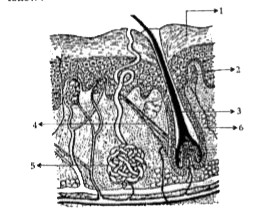
Label the parts 1 - 4.
View SolutionStudy the diagram and answer the questions that follow :
Label the parts 1 - 4
View SolutionStudy the diagram and answer the questions that follow :

Label the parts 1 - 4.
View SolutionStudy the diagram and answer the questions that follow:
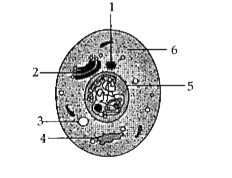
Label the parts 1 - 4.
View SolutionStudy the diagram and answer the questions that follow :
Write the dental formula of human.
View SolutionStudy the diagram given below and then answer the questions that follow :
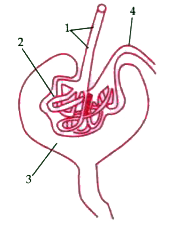
Name the parts labelled 1, 2, 3 and 4.
View SolutionStudy the diagram given below and then answer the question that follow :
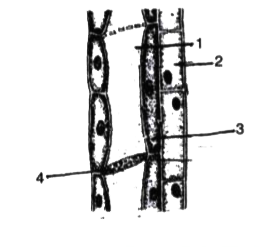
Name the parts labelled 1,2,3 and 4.
View SolutionStudy the diagram given below and then answer the questions that follow :
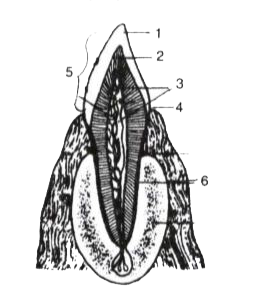
Give the total number of the type of tooth mentioned in '1' above in an adult and state its function.
View Solution
